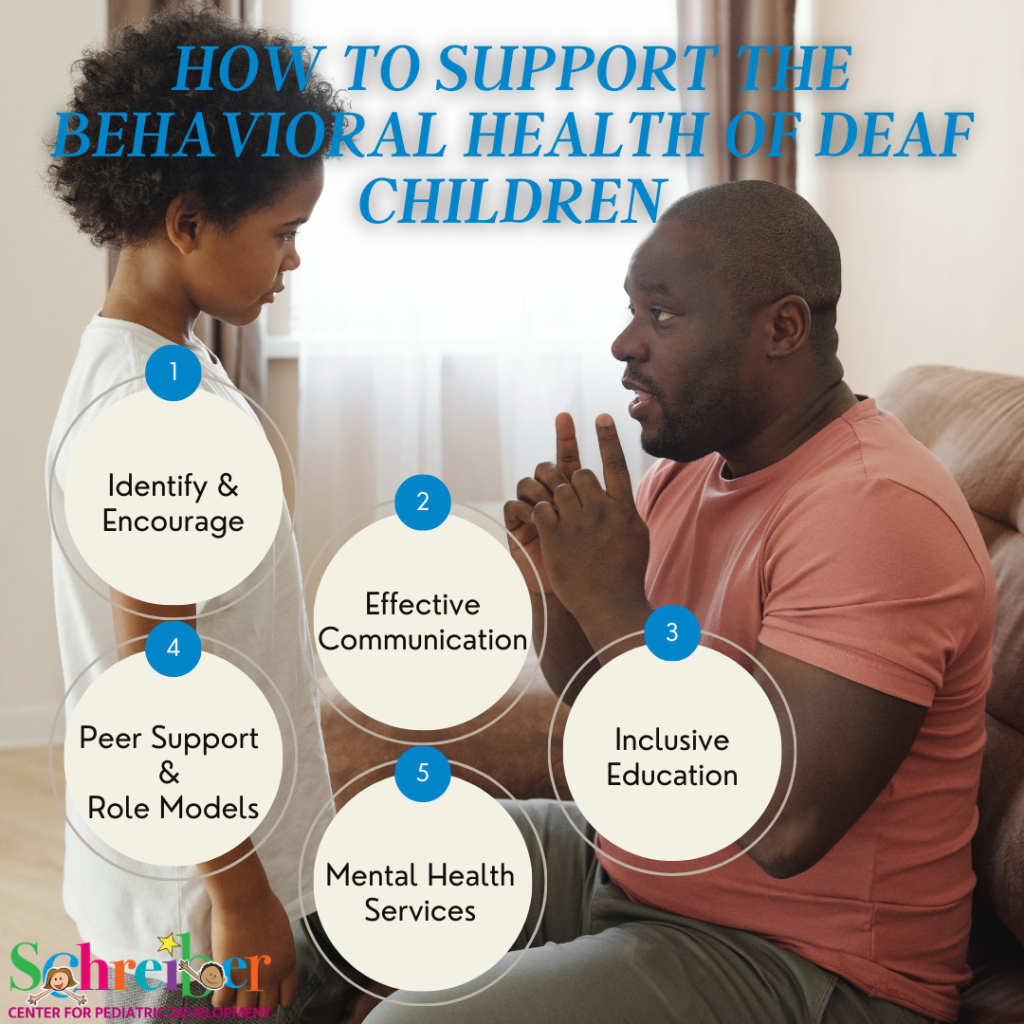Speech therapy
2024 Schreiber Ambassadors Announced at the 40th Annual Schreiber Gala!
March 18, 2024Every year we choose a few lucky kiddos to be Ambassadors of our mission. To join us as special guests at our events. To share their stories with our families and friends. To highlight the life-changing services our therapists are providing every day to those who need them most. This year we’re proud to announce that we have four amazing kiddos serving as Schreiber Ambassadors.
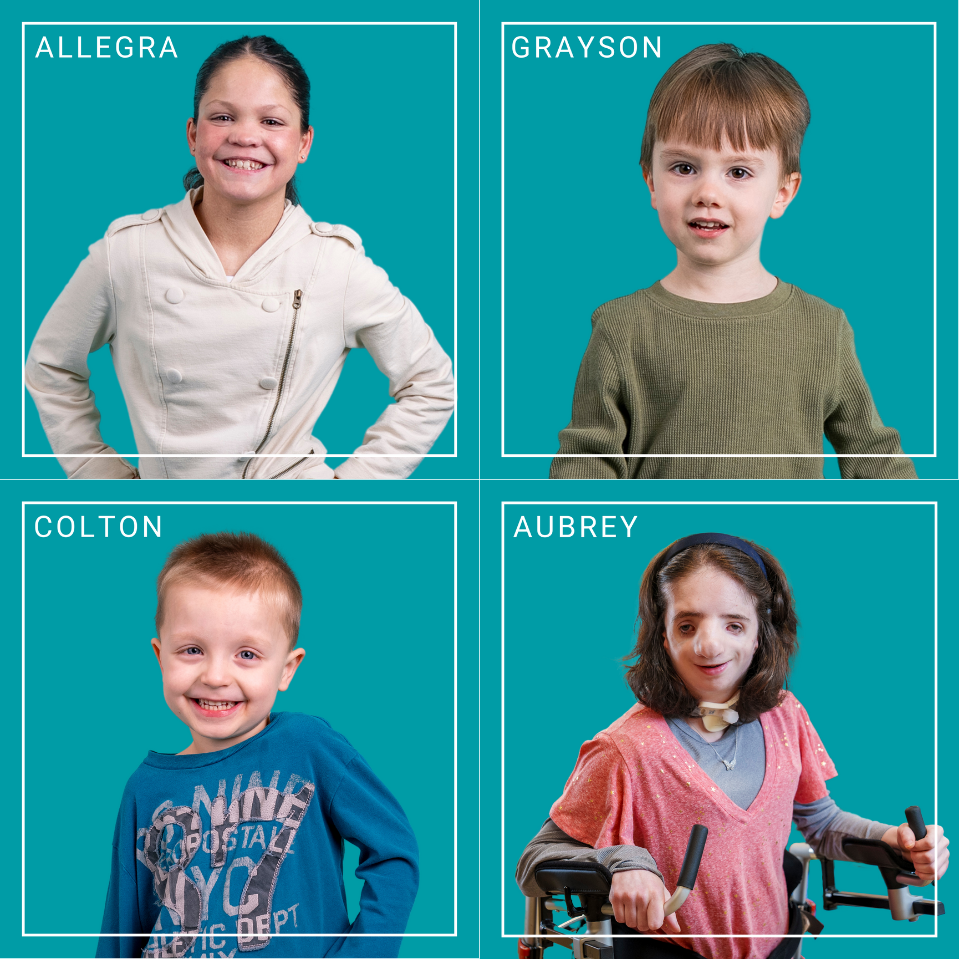
From oldest to youngest, we’d like to now introduce you to our 2024 Ambassadors, Aubrey Jacoby, Allegra Essis, Colton Kiss, and Grayson Smith.
Aubrey Jacoby
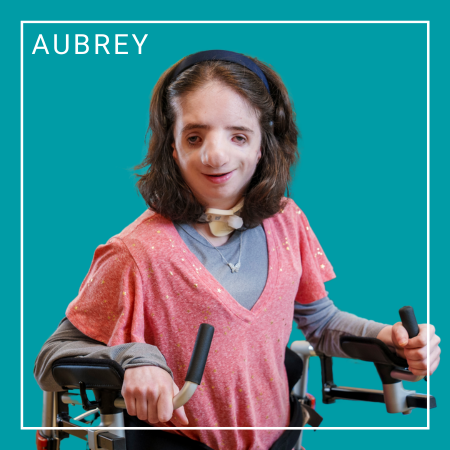
Aubrey is an 18-year-old, senior in high school, with a passion for video editing and a love of music. She has been a Schreiber client since she was three years old, when she began therapy sessions to counteract the physical effects of her cerebral palsy diagnosis. Through physical therapy and occupational therapy sessions Aubrey has gained and sustained both gross and fine motor skills that help her navigate through life as independently as possible.
Aubrey has undergone over 80 surgeries in her lifetime to combat difficulties associated with her diagnoses of both cerebral palsy and Treacher Collins syndrome. Because she had difficulty breathing one of these surgeries was to insert a tracheostomy tube, creating an opening in her trachea from the outside of the neck to help oxygen reach her lungs. She began speech therapy at Schreiber after that surgery and re-learned how to speak with the trach and use an augmentative and alternative communication (AAC) device to communicate with the world and has since graduated from speech therapy. Just like most 18-year-olds she’s excited to graduate from high school next, and start working on building a career for herself.
Allegra Essis
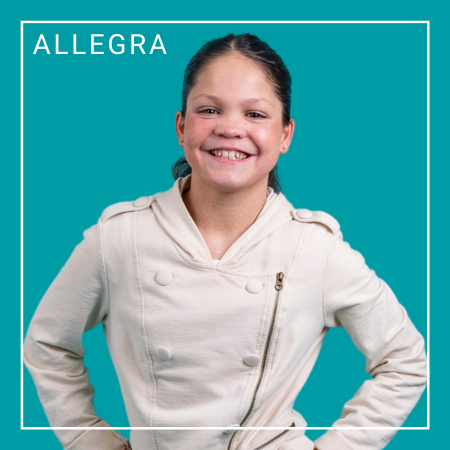
Allegra is 13 years old and in her last year of middle school, where she is a social butterfly with a flair for theater. When she was just an infant her parents enrolled her in early intervention therapy care to combat challenges she was facing with her gross motor skills. At five years old she was diagnosed with cerebral palsy and has been a frequent flyer at Schreiber for physical therapy ever since. During her time at Schreiber sha has gained a lot of core strength, flexibility, balance, and of course confidence which all help her pursue her interests in dance, horseback riding, and skiing.
Early on, Allegra had difficulties standing up, walking, running, balancing, and using stairs. Her parents’ initial goals were for her to gain the strength and balance needed to walk independently. She was fitted for orthotics to help stabilize her gait and help her do these activities, which she continues to use today. A recent surgery on her hamstrings set back her progress slightly when it left her wheelchair bound for a time. Through dedicated physical therapy sessions at Schreiber three times per week, she is now back to her normal, walking independently and participating in her many activities.
Colton Kiss
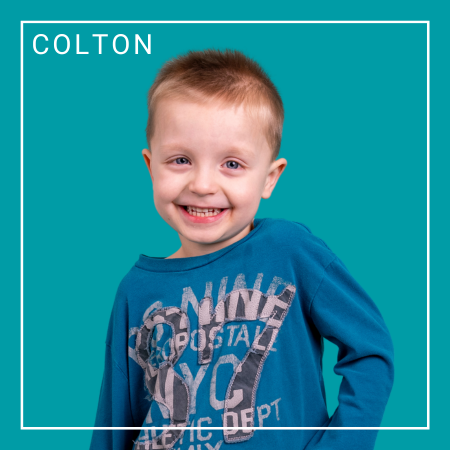
Colton is almost four years old, and attends our Circle of Friends Academy preschool, where he enjoys learning and playing with his friends. He has attended therapy at the Schreiber center for three years, after a complication at birth resulted in four brain hemorrhages as well as a blood clot on his cerebellum that caused permanent damage. Shortly after he was born his mom was told by doctors that he may never walk or talk due to the damage done. His mom was familiar with Schreiber and knew that our center was his best chance at beating those odds.
He currently participates in all four of our offered therapies, physical, occupational, speech, and behavioral health to help him combat the challenges of his diagnosis. Please who have known Colton through his entire journey have witnessed the miracle of his transformation. And people who meet Colton today would never believe that there was ever a chance that he may have never learned to walk or talk. His physical therapy sessions have helped him build core strength and balance needed to sit, stand, and walk on his own. Occupational therapy has helped him develop the coordination and focus needed to perform self-care tasks like dressing himself and feeding himself. Speech therapy has given him the ability to communicate his wants and needs with those around him. And behavioral health therapy has taught him how to communicate those wants and needs more appropriately.
Grayson Smith
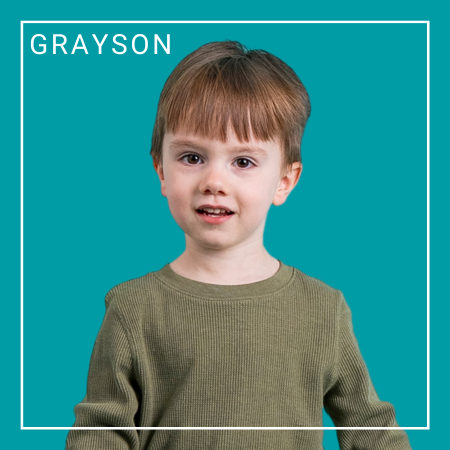
Grayson is three years old and has attended therapy at Schreiber since he was just nine months old. First for physical therapy to address a diagnosis of low tone, where he built the strength and coordination required to sit, stand, walk, and run on his own. A year after starting and later graduating from physical therapy he was also diagnosed with level 1 autism. At which time he began speech therapy and occupational therapy to help him gain both physical and social skills.
Once a week, he still comes to the Schreiber center to work on his sensory processing skills, social skills, and self-care tasks in occupational therapy. He uses the skills he learns in therapy every day to express his wants and needs effectively with those around him and navigate through new social situations that would have had him shutting down in the past. Thanks to occupational therapy he is also now able and willing to perform daily self-care tasks on his own and with the help of his parents without a struggle. His parents are confident that the tools he’s learning in therapy will ensure that he is developmentally ready for school in the next few years. His confidence has already grown tremendously as he learns to self-advocate and even initiate new friendships on the playground.


While each of our 2024 ambassadors have been attending therapies at the Schreiber center for a few years, we will be highlighting their progress and achievements on our social media channels this year to allow our friends and supporters to witness firsthand what makes our pediatric therapy center so special. So, make sure to follow us on Facebook and Instagram to watch their stories unfold.
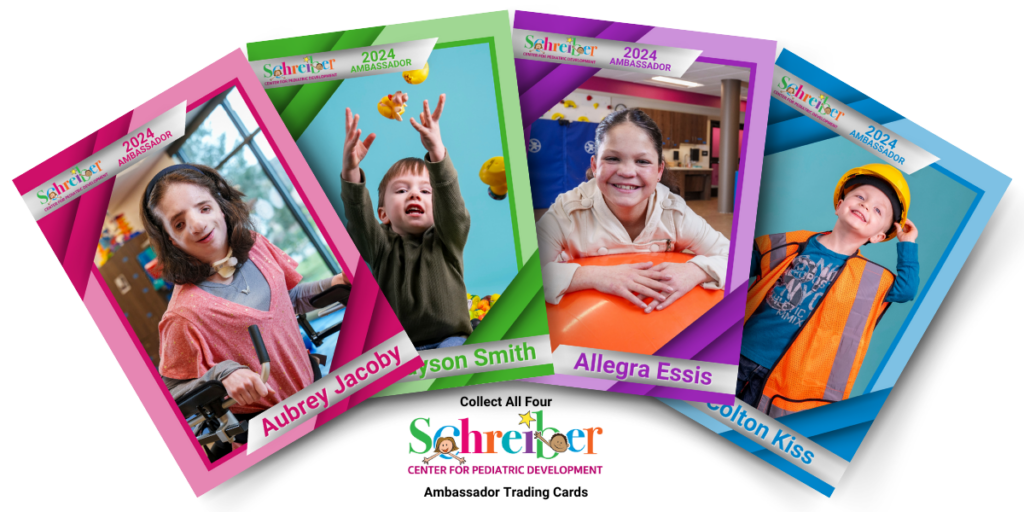
We’ve also made fun collectible trading cards for each of our 2024 ambassadors to hand out to fellow Schreiber families, friends, and supporters during our various fundraising and community events throughout the year. These cards highlight the therapy journey of each ambassador and celebrate how far they have each come. Attend all our events and collect each ambassadors trading card for special keepsake showcasing your support of all Schreiber kids.
Help Schreiber Kids like our Ambassadors receive the care they need, by donating in support of our Kids’ Care Fund, a long and short term savings account used to cover the costs of uncompensated care.
As a nationally recognized pediatric facility, the Schreiber Center for Pediatric Development provides family-centered education and therapy programs for infants, children and adolescents with disabilities, developmental delays, and acquired injuries. Our goal-oriented approach maximizes each child’s ability to function independently within the community.
General Monthly eNewsletter Sign Up
Sign up to receive monthly newsletters to your email box to learn more about what is going on at the Schreiber Center, and how you can help support our mission to help every child in need reach their fullest potential.
Therapists at Schreiber Went Above and Beyond to Help My Son Thrive: A Personal Testimonial
February 27, 2024Written by: Schreiber Client Brayden’s Mom, Alicia Earnesty
Brayden has been attending therapy at Schreiber Center for Pediatric Development for over 5 years now. As a medically complex child, Brayden has many diagnosis and challenges including intractable epilepsy(LGS) and cortical visual impairment. He first began receiving PT, OT, Speech, Feeding and Aqua therapy as we desperately searched for ways to help. He was unable to hold his head up, bare weight, sit up, functional use his hands or share any form of communication.

The amazing therapist at Schreiber immediately began to create a plan. His team has went above and beyond to research, learn other strategies and implement accommodations to help him thrive. The begin years were a true struggle to make progress in the midst of survival mode between hospitalizations and seizures. Covid hit which forced us to pivot to virtual therapy for 2 years working remotely from our basement therapy room. The amazing therapist never gave up and little by little we celebrated Brayden’s inch stones. We celebrated sitting on his own, sit to stand, learning to crawl, standing with support, utilizing both hands, grabbing/holding objects, pointing, saying his first words, making choices and using a communication device. Brayden underwent several brain surgeries over the years and the therapist never skipped a beat to help him rehab, bounce back and make leaps of progress.
Looking back upon all the years of intensive therapy, it brings joyful tears to our eyes as to how far Brayden has come. Today, Brayden is a walking talking miracle and true representation to never give up hope. Brayden can voice, sign and use his adapted communication device to share what he is thinking, needing and even what he doesn’t want. Brayden can now eat foods by mouth and working so hard on independent fine motor skills. Brayden can now independently walk, go up/down stairs, squat to pick up items, and even run!
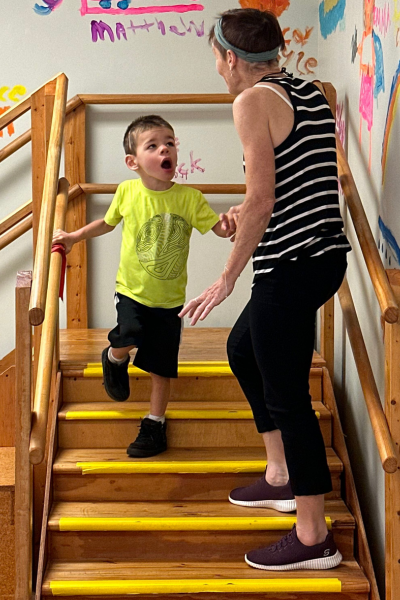
Brayden waves and squeals with excitement on therapy days. We love calling “the duck duck place” (as Brayden calls it) home as Schreiber has become family and we are forever grateful for the staff and therapists. Thank you to Lisa, Maddy, Rebecca, Libby, Deanna, Meghan, Sarah, Christen, Adrian and so many more for your impact on his journey. To other families looking for the supports your child needs, Schreiber is the BEST in the area hands down. Partnering with them and continuing to implement at home, the sky is the limit!
Help Schreiber Clients like Brayden receive the care they need, consider donating in support of our Kids’ Care Fund, a long and short term savings account used to cover the costs of uncompensated care.
As a nationally recognized pediatric facility, the Schreiber Center for Pediatric Development provides family-centered education and therapy programs for infants, children and adolescents with disabilities, developmental delays, and acquired injuries. Our goal-oriented approach maximizes each child’s ability to function independently within the community.
General Monthly eNewsletter Sign Up
Sign up to receive monthly newsletters to your email box to learn more about what is going on at the Schreiber Center, and how you can help support our mission to help every child in need reach their fullest potential.
VitalStim Therapy for Dysphasia Now Offered at the Schreiber Center
February 15, 2024We’re delighted to announce that with the addition of Ashley Shaffer to our speech-language department we are now able to offer VitalStim therapy for kids with swallowing disorders. Ashley is the first of our speech-language pathologists to become certified in this revolutionary non-invasive therapy that uses electrical currents to stimulate the throat muscles for proper and safe swallowing. As the only FDA approved device for the treatment of dysphagia, or difficulty swallowing, we are thrilled to add this treatment option to our arsenal.
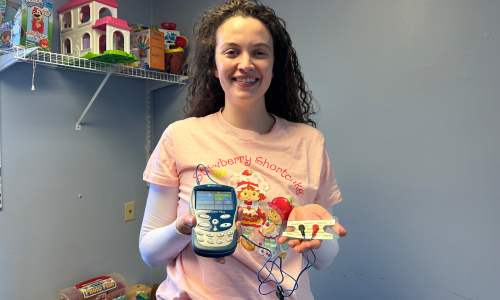
Of course, even with a speech-language pathologist who was certified in this therapy technique, without the necessary equipment we would not be able to offer this life-changing therapy to our Schreiber kids. Thankfully in October of 2023, we received $13,050 from the GIANT Company through their Make a Difference Challenge, which has allowed us to purchase the VitalStim Plus Electrotherapy and SEMG Biofeedback System and VitalStim Electrodes. With access to this state-of-the-art equipment, we no longer have to turn children who need this specialized therapy service away or refer them to other healthcare providers to receive the care they need.

The most common difficulties related to feeding seen at Schreiber are children with difficulties related to the oral stage of swallowing. But now that we offer VitalStim therapy at the Schreiber Center as an option to clients struggling in the pharyngeal phase of swallowing, we expect to be able to serve even more children with feeding challenges.
Many of us consider swallowing to be an automatic reflex but medically it’s a complex action involving roughly 50 pairs of muscles and nerves that require coordination in a 3-stage process to move food or liquid from the mouth to the stomach. The first of these three stages is the oral phase which includes gathering food in the mouth and chewing. Dysphasia in this phase may cause difficulty chewing or manipulating the food in the mouth. Traditional feeding therapies are most effective with oral phase dysphasia.
The second stage is the pharyngeal phase which is the first stage of swallowing where the food begins to move from the mouth through the pharynx, during which time the airway must be protected to avoid food or liquid entering the airway. Dysphasia in this phase involves difficulty coordinating these muscle movements leading to difficulties in clearing the airway and moving the food to the esophagus. This is the phase where VitalStim therapy for dysphasia is most helpful, as it improves the coordination and strength of the muscles involved in this phase.
The third stage of moving food or liquid from the mouth to the stomach is called the esophageal phase and is the final phase where the food is transported through the esophagus and into the stomach. Dysphagia in this phase can be caused by a narrowing in the esophagus or poor muscle coordination in the esophagus. Dysphasia in this phase often requires dilation procedures, medication or in some cases surgical intervention.
There are several reasons why a child might need feeding therapy including: children with neuromuscular disorders who experience weakness of the throat muscles, children with congenital conditions such as cleft palates, children with developmental delays that may affect their ability or willingness to swallow various textures or liquids, and of course children who have undergone surgery or have experienced an injury which effects the muscles involved in swallowing. In each of these situations the children who need it will now be able to benefit from the use of VitalStim therapy in their sessions. This marks a significant leap forward in our mission to provide the best possible care for every child that enters our doors.
Author’s Note:
The valuable insights and information shared in this article were provided by the Schreiber Center for Pediatric Development’s pediatric speech-language pathologist Ashley Shaffer. Her extensive knowledge and experience has been essential in shaping the content of this piece.
Contribute to the Kids’ Care Fund now to ensure that children in need, both present and future, receive these essential services regardless of their family’s financial situation.
As a nationally recognized pediatric facility, the Schreiber Center for Pediatric Development provides family-centered education and therapy programs for infants, children and adolescents with disabilities, developmental delays, and acquired injuries. Our goal-oriented approach maximizes each child’s ability to function independently within the community.
Small Victories Creating Big Impacts for the Morales Family
January 8, 2024Teresa, the youngest, and fifth of the Morales children to receive pediatric therapy services here at the Schreiber Center faced hurdles with her speech and fine motor skills. Her parents, already familiar with the impact of our services, turned to Schreiber again, in the hopes that we could help Teresa savor the simple joys of childhood and build the tools necessary to succeed in adulthood.

Early life for Teresa felt like a puzzle missing crucial pieces. Her toys requiring nimble fingers laid untouched, and words escaped her, leaving her frustrated and easily overwhelmed. Family outings felt more like survival missions than moments to cherish.
Following Early Intervention services, Evelyn brought Teresa to Schreiber where she embarked on a journey to unravel her potential. With each session, her therapists Maddy, Camilla, and later Sarah weren’t just guiding her through exercises, but rather sculpting experiences tailored to Teresa’s interests. Sensory integration was a cornerstone to her sessions, weaving therapy tasks with activities specifically designed to help balance her sensory needs and help her focus on her therapy tasks. It was in these moments that she found the balance she needed to thrive.
Now, Sarah and Maddy skillfully maintain Teresa’s focus during therapy by introducing captivating games and activities tailored to her interests. By aligning tasks with her current preferences, they’ve witnessed incredible strides. Teresa’s artistic abilities have flourished, delighting her mother, who proudly exclaims, “She can draw a person now!” This achievement stands as a monumental step for Teresa, considering her past aversion to crayons due to sensory issues.
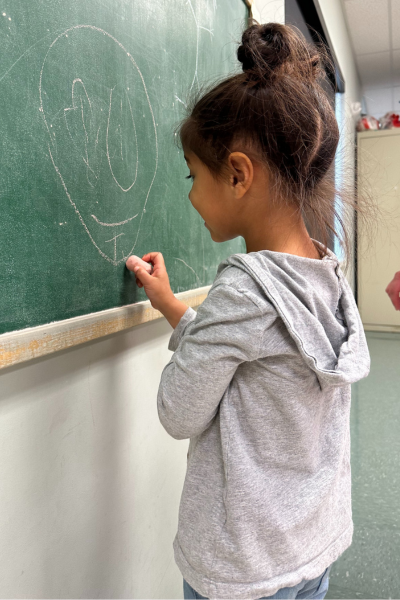
Her therapists have each provided the family with strategies to support her progress at home. As a result, the entire household now actively engages in sensory activities and verbal interactions. Evelyn shares that “I’m overstimulated” has become a familiar phrase in their home which serves as a unique tool for the family, helping them not only acknowledge their individual thresholds but also establish personal boundaries within the household.
Aside from engaging in sensory exercises at home, the family actively aids Teresa’s language development. Through guidance from Maddy, they’ve discovered that avoiding direct questions like “What color is this?” in favor of options like “Would you like to color this blue?” and allowing Teresa to express her choice by finding the specific color she prefers is a more effective learning approach for her.
Gaining confidence in her language abilities has empowered Teresa to voice her desires and needs effectively. Her newfound skills in self-advocacy have transformed her life. Now attending a mainstream preschool, she joyfully engages with friends, relishing playtime in the make-believe kitchen. Teresa has evolved from merely trailing her friends and staying silent to being an active participant, engaging in reciprocal play and conversation. She’s even developed a fondness for family outings and group activities, enhancing not only her own experience but the collective enjoyment of her entire family.

Evelyn, having navigated the therapeutic journey with five of her children at the Schreiber Center, imparts a valuable lesson for families walking a similar path. Her wisdom encapsulates the essence of patience and cherishing the seemingly small victories. In her words, “Be patient. Appreciate the small things. Sometimes parents get too caught up in the big milestones and forget to celebrate the small improvements. It’s those small things that are a big deal and celebrating them helps keep your child motivated to keep working towards reaching the big goals.”
Help Schreiber Clients like Teresa receive the care they need, consider donating in support of our Kids’ Care Fund, a long and short term savings account used to cover the costs of uncompensated care.
As a nationally recognized pediatric facility, the Schreiber Center for Pediatric Development provides family-centered education and therapy programs for infants, children and adolescents with disabilities, developmental delays, and acquired injuries. Our goal-oriented approach maximizes each child’s ability to function independently within the community.
Thank You to our 2023 Ambassadors!
December 31, 2023As we reflect on 2023, we are filled with gratitude for the amazing kids and families who have allowed us to spotlight their journeys through our therapy services, the true champions of our mission – our 2023 Schreiber Ambassadors!

It is through your tireless efforts that you’ve helped spread awareness about the vital work we do at Schreiber. Your advocacy has not only shone a spotlight on the challenges faced by those we serve but has also illuminated the pathways to hope and healing that our organization provides.
Your participation in our fundraising initiatives has been nothing short of extraordinary. By leveraging your networks and utilizing your influential voices, you’ve helped reach and exceed our goals all year so that we can continue making a meaningful difference in the lives of all #SchreiberKids. Your commitment to the betterment of our community is not only commendable, but also deeply appreciated.
As we express our gratitude, we also want to acknowledge the impact you’ve had on fostering a sense of community and belonging within the Schreiber family. Your enthusiasm has resonated with others, creating a ripple effect that strengthens the bonds of support and solidarity among those who share a connection to our organization.
In recognition of your exceptional contributions, we want to express our deepest appreciation. Your willingness to be ambassadors for Schreiber has not only elevated our mission but has also touched the hearts of those who have had the privilege of hearing your stories.
Thank you, 2023 Schreiber Ambassadors, for everything you’ve done to support our mission this year!
Support the therapy and education of our current and future Schreiber kids by donating to our Kids’ Care Fund today!
As a nationally recognized pediatric facility, the Schreiber Center for Pediatric Development provides family-centered education and therapy programs for infants, children and adolescents with disabilities, developmental delays, and acquired injuries. Our goal-oriented approach maximizes each child’s ability to function independently within the community.
Empowering Avery: The Impact of Early Intervention Speech Therapy
November 28, 2023Born at a mere 29 weeks, Avery Berry spent the initial 57 days of her life at the Neonatal Intensive Care Unit (NICU) at Women’s and Babies, where Children’s Hospital of Philadelphia (CHOP) doctors, nurses, and her family rallied around her until she was strong enough to go home.
For her first two years her parents enveloped her in a world of language, speaking, singing, and reading to her. Despite cooing and babbling back, at two years old, Avery still showed no sign of language development. Concerned but undeterred, her parents and physicians explored Early Intervention speech therapy options for her.
Avery’s mom, Angie, believes that their NICU experience with CHOP doctors contributed to their swift acceptance into Early Intervention services. Once accepted, they chose to pursue therapy at the Schreiber Center for Pediatric Development.
Avery’s first year of speech therapy took place within the familiar confines of her own home three times a week, under the guidance of her therapist, Cassie. Her family’s primary goal was simple: to help Avery find words. While her parents diligently worked on baby sign language to bridge the language gap, their ultimate hope was to witness her communicate with the world.

Angie reminisces, “While she wasn’t necessarily shy, she struggled to connect with kids her age due to her communication limitations.” But through play-based therapies with Cassie and consistent practice with her parents, Avery embarked on her journey to building her language skills. Cassie’s creative and ever-changing repertoire of toys and games kept Avery engaged and excited during each session.
And then, one day, it happened. Avery uttered her first word – “Moo”. Both Angie and Cassie couldn’t help but shed tears of joy. Avery, who had once been unable to form words, had taken her first monumental step. Shortly after, she astounded them by saying ‘meow,’ a challenging word for any young speaker, let alone someone who had just begun their speech therapy journey.
Between therapy sessions Avery’s parents worked with her on every technique that Cassie modeled for them. One of the things that Angie believes helped Avery most was a technique called Visual Biofeedback, or mirror-play. Everyday Angie and Avery would stand in front of a mirror in their home and talk to each other. This allowed Avery to become more aware of her own facial expressions and speech sound productions, and eventually led to her gaining more voluntary control of her facial and oral structures.
Angie reflects, “Avery never became frustrated or angry about her inability to articulate her needs because she received the time and attention she needed, along with the support of her therapists and us.”

Once she aged out of Early Intervention, Avery started to attend Schreiber Center for speech therapy and began working with Becca, who she sees weekly. She is also enrolled in our S.T.A.R.S. Preschool and loves her teachers Mr. Jay and Ms. Michele. Angie proudly boasts “After two years of speech therapy at Schreiber Avery’s self-confidence with social interactions has sky rocketed. Now that she can speak and communicate effectively her confidence has soared, she’s made a ton of friends in preschool, and is comfortable expressing herself.”
When Avery isn’t in speech therapy or preschool, she and her mom love going to the park to play, taking little shopping trips to Target, and going to the library to check out new books to read together. At only four years old, Avery has become quite a little bookworm, and while her parents still read to her often, she loves being able to read to them too.
She and dad love playing outside, taking walks, and working on projects. She wants to be a hands-on helper for all projects in and out of the house. Her parents say they wouldn’t be surprised if Avery grew up to become an engineer because of her curiosity about how things are made and how they work. To encourage her creativity and curiosity every few months she gets a ‘Discovery Kit’ in the mail that includes a craft or project that she and her dad work on together.

One lesson that Angie learned through Avery’s therapy journey is that “Comparison is the thief of joy” so while she is incredibly proud of Avery’s reading skills and ingenuity, she also understands firsthand how difficult it is to watch other children develop on a different timeline than your own. “We tell Avery all the time that she is right on time with her own journey.” Angie shares. Which we think is a perfect reminder for us all, not to compare ourselves or our children to anyone else.
It’s difficult for parents and families who aren’t going through pediatric therapy services for their children to understand what it’s like, but Avery’s parents found community at the Schreiber Center through Schreiber’s hosted events and by bonding with other families in the waiting room. Angie advises any parent who is considering pediatric therapy for their own children to “Do it! The earlier the better and don’t compare your journey, or your child’s progress against anyone else.”

Help Schreiber Clients like Avery receive the care they need, consider donating in support of our Kids’ Care Fund, a long and short term savings account used to cover the costs of uncompensated care.
As a nationally recognized pediatric facility, the Schreiber Center for Pediatric Development provides family-centered education and therapy programs for infants, children and adolescents with disabilities, developmental delays, and acquired injuries. Our goal-oriented approach maximizes each child’s ability to function independently within the community.
ExtraGive Funds Pediatric Therapy at Schreiber
October 31, 2023Every child deserves the opportunity to lead a healthy and fulfilling life. At the Schreiber Center for Pediatric Development, we are committed to ensuring that every child, regardless of their abilities or financial circumstances, has access to the quality care they need.

The ExtraGive event (https://www.extragive.org/) is a remarkable opportunity for us to come together as a community and make a significant impact on the lives of children who rely on our pediatric therapy programs. Your generous donations during the ExtraGive event will directly benefit our occupational, physical, speech, and mental and behavioral health therapy programs, as well as our “Kids’ Care Fund” designed to cover uncompensated care expenses.
Pediatric Occupational Therapy: Feeding Program
Pediatric occupational therapy is a crucial component of the services we provide at Schreiber Center for Pediatric Development. Many children face challenges related to feeding and nutrition, and our goal is to support them in developing the necessary skills for a healthy diet. Your donations will help us establish a new feeding program that will provide personalized support to children with various feeding difficulties.
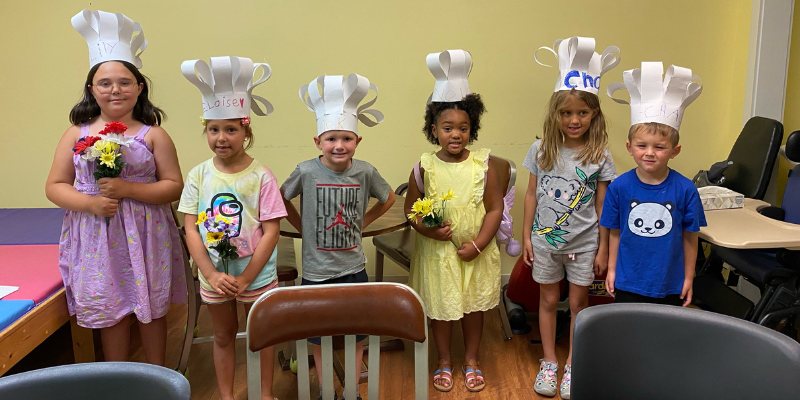
Feeding issues can be a source of tremendous stress for families, and your contributions will make it possible for us to offer specialized therapy, equipment, and resources to help these children develop the skills they need to thrive.
Pediatric Physical Therapy: Medical Mobility Equipment

Children with mobility impairments often require specialized equipment to enhance their mobility and independence. The funds donated during the ExtraGive event will be instrumental in acquiring essential medical mobility equipment for our pediatric physical therapy program.
These devices can be life-changing for children, enabling them to participate in everyday activities and improving their overall quality of life. Your support will help us ensure that no child in central PA is left without the necessary equipment to navigate the world around them.
Pediatric Speech Therapy: Communication Devices
Communication is a fundamental aspect of a child’s development, and for some children, it can be particularly challenging. Our pediatric speech therapy program is dedicated to helping children develop their communication skills, and your donations will play a pivotal role in achieving this goal.
We aim to provide augmentative and alternative communication (AAC) devices, speech-generating devices (SGDs), and other assistive communication tools to children who need them. These devices empower children to express themselves, connect with others, and engage with the world in meaningful ways.

Mental and Behavioral Health Therapy: After-School Social Programs
At Schreiber Center for Pediatric Development, we recognize the importance of mental and behavioral health in a child’s overall well-being. Your donations will support our after-school social programs, including the popular “After-School Lego Club,” designed specifically for children with autism.
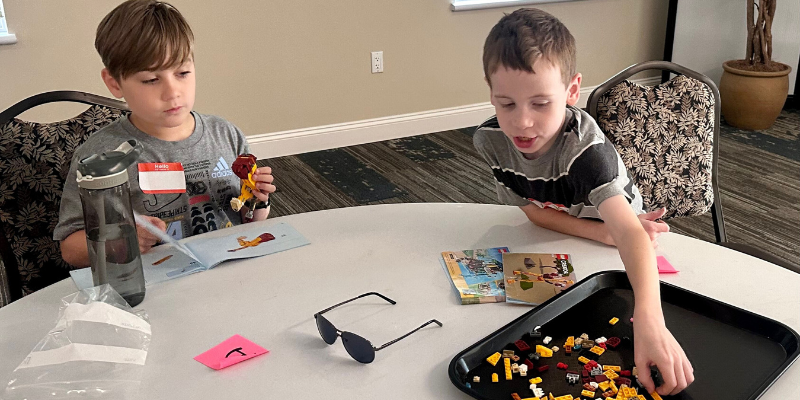
These programs offer a safe and supportive environment where children can develop social skills, build friendships, and gain confidence. Your contributions will enable us to expand these programs, reaching even more children who can benefit from them.
The “Kids’ Care Fund”: Ensuring Access to Care for All
In addition to directly supporting our therapy programs, your generous donations during the ExtraGive event will be added to our “Kids’ Care Fund.” This fund serves as a safety net, ensuring that all disabled children receive the care they need, regardless of their families’ financial circumstances.
The “Kids’ Care Fund” is a savings account that bridges the gap between what private insurance and Medicaid supplements cover and the actual cost of care. At Schreiber Pediatric, we have always made the promise that no child will be turned away, and your contributions help us fulfill this commitment.

Your support during the ExtraGive event will have a profound and lasting impact on the lives of the children we serve through our pediatric therapy programs at Schreiber Center for Pediatric Development. Whether it’s helping a child improve their feeding skills, providing essential mobility equipment, enabling communication, or fostering social connections, your generosity makes it all possible.
Furthermore, your donations will contribute to the “Kids’ Care Fund,” ensuring that no child is denied the care they deserve due to financial constraints. Together, we can make a difference in the lives of Schreiber kids and their families, offering hope, support, and a brighter future. Join us in transforming lives and creating a more inclusive and compassionate community for all children in central PA. Donate during the ExtraGive event and be a part of something truly extraordinary.
Down Syndrome Awareness Month
October 16, 2023This month we have the opportunity to raise public awareness about the condition Down Syndrome, as we advocate for the inclusion and acceptance of people with Down Syndrome. It is an unfortunate fact that people with Down Syndrome continue to face stereotypes and misconceptions about their abilities. We urge you to take this month to learn more about this condition and help us to spread the message of acceptance and respect for all people with Down Syndrome all year round.
What is Down Syndrome?
Down Syndrome is a genetic condition that occurs when a person is born with an extra chromosome. People are typically born with 46 chromosomes, but a person with Down Syndrome has an extra copy or part of an extra copy or chromosome 21.
There are three different types of Down Syndrome, and they are all dependent on how the extra chromosome 21 presents within the diagnosed person.
The most common type of Down Syndrome is called Trisomy 21, and about 95% of people who are diagnosed with Down Syndrome are diagnosed with this type. Trisomy 21 means that each cell within the body has three copies of chromosome 21 instead of the usual two copies.
The second most common type of Down Syndrome is called Translocation Down Syndrome and only about 3% of people diagnosed with Down Syndrome have this type. Translocation Down Syndrome occurs when an extra part or a whole extra chromosome 21 is present but attached ‘trans-located’ to a different chromosome, rather than being separate as is the case of Trisomy 21.
The least common type of Down Syndrome is called Mosaic Down Syndrome and only 2% of people who are diagnosed with Down Syndrome have this type. Mosaic Down Syndrome means that some of the cells in the body have three copies of chromosome 21, but other cells in the body still only have the typical two copies. Because only some of the cells in the body contain this additional chromosome this type of Down Syndrome presents less dominantly in physical features than the other two.
How do I know if my child has Down Syndrome?
About 6,000 babies are born with Down Syndrome in the US every year: that’s about 1 in every 700 babies. Down Syndrome can be detected in utero with screening tests and/or diagnostic tests. Screening tests can tell you if your pregnancy has a higher or lower chance of resulting in a baby with Down Syndrome, but they do not provide an absolute diagnosis. Diagnostic tests on the other hand, can typically detect whether a baby will have Down Syndrome. Diagnostic tests can be risky and are not generally performed until after a positive screening test. They include Chorionic villus sampling (CVS) which examines the material from the placenta, Amniocentesis which examines the amniotic fluid, and Percutaneous umbilical blood sampling (PUBS) which examines the blood from the umbilical cord. Each of these tests look for changes in the chromosomes that would indicate a Down Syndrome diagnosis.
What causes Down Syndrome?
Researchers know that Down Syndrome occurs when a person is born with an extra chromosome 21, but they are unsure how or why the extra chromosome forms. Many researchers believe that there are several different factors that play a role in whether the extra chromosome 21 will form in utero, but they are not entirely sure what those factors are. It is known that the likelihood of a baby being born with Down Syndrome increases with a mother’s age, but because more women give birth before they turn 35, more babies with Down Syndrome are born to women under 35 years of age. Nothing that a parent does during pregnancy is known to cause Down Syndrome.
What are the complications of Down Syndrome?
About half of people with Down Syndrome also have a congenital heart defect. They are also more prone to hearing loss, ear infections, obstructive sleep apnea, respiratory issues, eye diseases, poor eyesight, Alzhemer’s disease, leukemia, thyroid disorders and intestinal blockages at birth that require surgery.
In addition to the physical complications that can come along with Down Syndrome, it can also cause intellectual and developmental symptoms that can lead to cognitive impairment. Similar to the physical complications these symptoms can range from mild to moderate and include short attention span, poor judgement, impulsive behavior, slow learning, and delayed language and speech development.
What is the treatment for Down Syndrome?
Making sure that a child with Down Syndrome receives services early in life will help them to improve their physical and intellectual abilities and ensure that they reach their full potential into adulthood. Most of the services recommended for children with Down Syndrome focus specifically on helping them minimize the effects of any intellectual or developmental symptoms the condition is responsible for. Early intervention services include speech therapy, occupational therapy, and physical therapy.
These therapies can be beneficial to children with Down Syndrome past the years of early intervention as well. Each person with Down Syndrome has different talents, and they all have the ability to thrive. Down Syndrome is a lifelong condition and children with Down Syndrome may need extra help or attention in school, but with the proper treatment plan and early intervention many people with Down Syndrome are able to be mainstreamed and attend regular classes with their peers.
If you child has been diagnosed with Down Syndrome and you are interested in learning more about how Schreiber’s Pediatric Therapies can help your child visit: http://www.schreiberpediatric.org/therapy-services/
As a nationally recognized pediatric facility, the Schreiber Center for Pediatric Development provides family-centered education and therapy programs for infants, children and adolescents with disabilities, developmental delays, and acquired injuries. Our goal-oriented approach maximizes each child’s ability to function independently within the community.
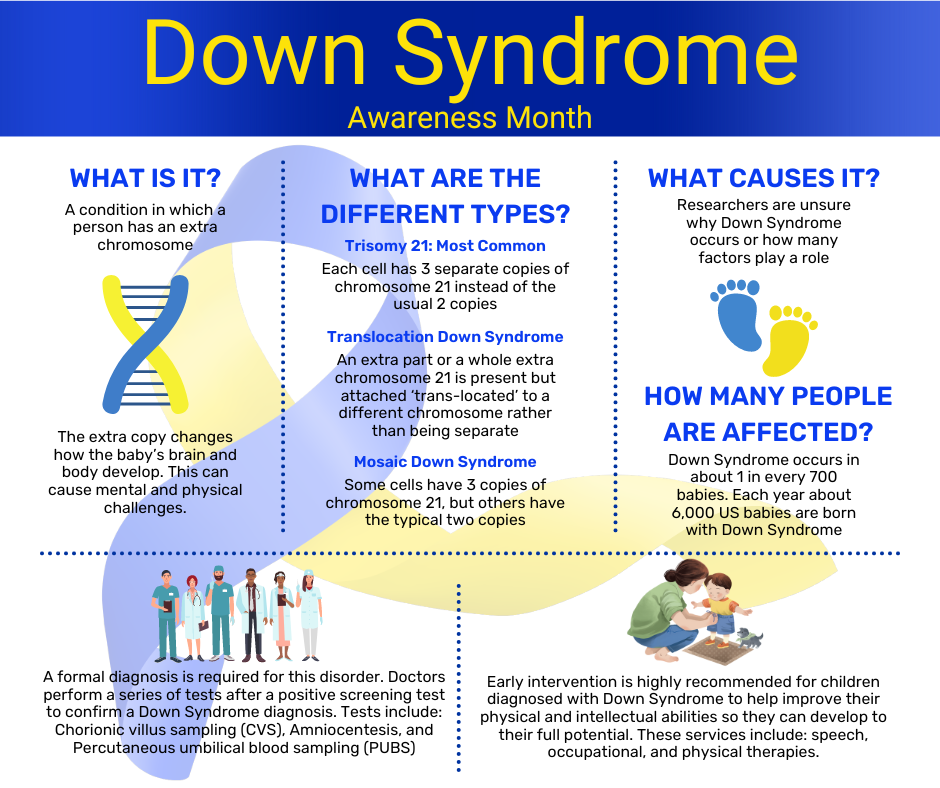
Early Intervention for Deaf Children
September 22, 2023Communication is essential for human interaction. Unfortunately, Deaf children face challenges in communication that can significantly affect their development. The good news is, early intervention during their infancy and toddler years can greatly lessen these communication barriers with the hearing world.
By providing specialized assistance in these critical early years, we have the opportunity to guide them towards a better future. From acquiring language skills to integrating socially, early intervention plays a crucial role in shaping their development.
Starting Early: Laying the Foundation
Detecting and addressing hearing loss early is crucial to establish a solid learning foundation for Deaf infants and toddlers. At Schreiber, we take pride in minimizing waiting times for children to be assessed by our dedicated pediatric therapists. Identifying the needs of Deaf infants and children promptly and offering appropriate support enhances their developmental trajectory. Early intervention acts as the key that unlocks their potential, equipping them with the tools to navigate communication effectively.
Communication Choices: Empowering Families
Empowering families to select communication methods for their Deaf children is pivotal to their success. Families can opt for American Sign Language (ASL), speech development, or a combination of approaches. By tailoring their approach to suit their child’s individual needs and preferences, families can enhance the likelihood of their child’s success.
Qualified Professionals: Guiding Growth
Based on the chosen communication method, Schreiber’s speech therapists collaborate with Deaf children to overcome communication barriers. These therapists recognize that communication extends beyond words; it encompasses self-expression, understanding, and building meaningful connections. Using innovative techniques and compassionate care, our therapists empower Deaf children to confidently navigate the world of communication.
Individualized Plans: Unleashing Potential
There’s no one-size-fits-all solution in early intervention for Deaf children. Schreiber’s speech therapists acknowledge the uniqueness of each child’s journey and create personalized intervention plans that encompass a variety of strategies. These plans cater to each child’s strengths and needs, ranging from fostering proficiency in American Sign Language (ASL) to enhancing speech development. Recognizing that progress isn’t linear, Schreiber’s speech therapists provide a supportive environment where children can explore different communication avenues at their own pace.
A Pathway and A Promise
Early intervention not only bridges communication gaps but also establishes a strong foundation for lifelong learning and success. As we advocate for inclusive and accessible child development approaches, it’s crucial for parents, caregivers, educators, and healthcare professionals to collaborate to ensure that every Deaf infant and toddler receives the necessary support to thrive on their unique journey. Early intervention isn’t merely a pathway; it’s a promise of a brighter future for every Deaf child.
If you child is Deaf and you are interested in learning more about how Schreiber’s Pediatric Therapies can help your child visit: http://www.schreiberpediatric.org/therapy-services/
As a nationally recognized pediatric facility, the Schreiber Center for Pediatric Development provides family-centered education and therapy programs for infants, children and adolescents with disabilities, developmental delays, and acquired injuries. Our goal-oriented approach maximizes each child’s ability to function independently within the community.
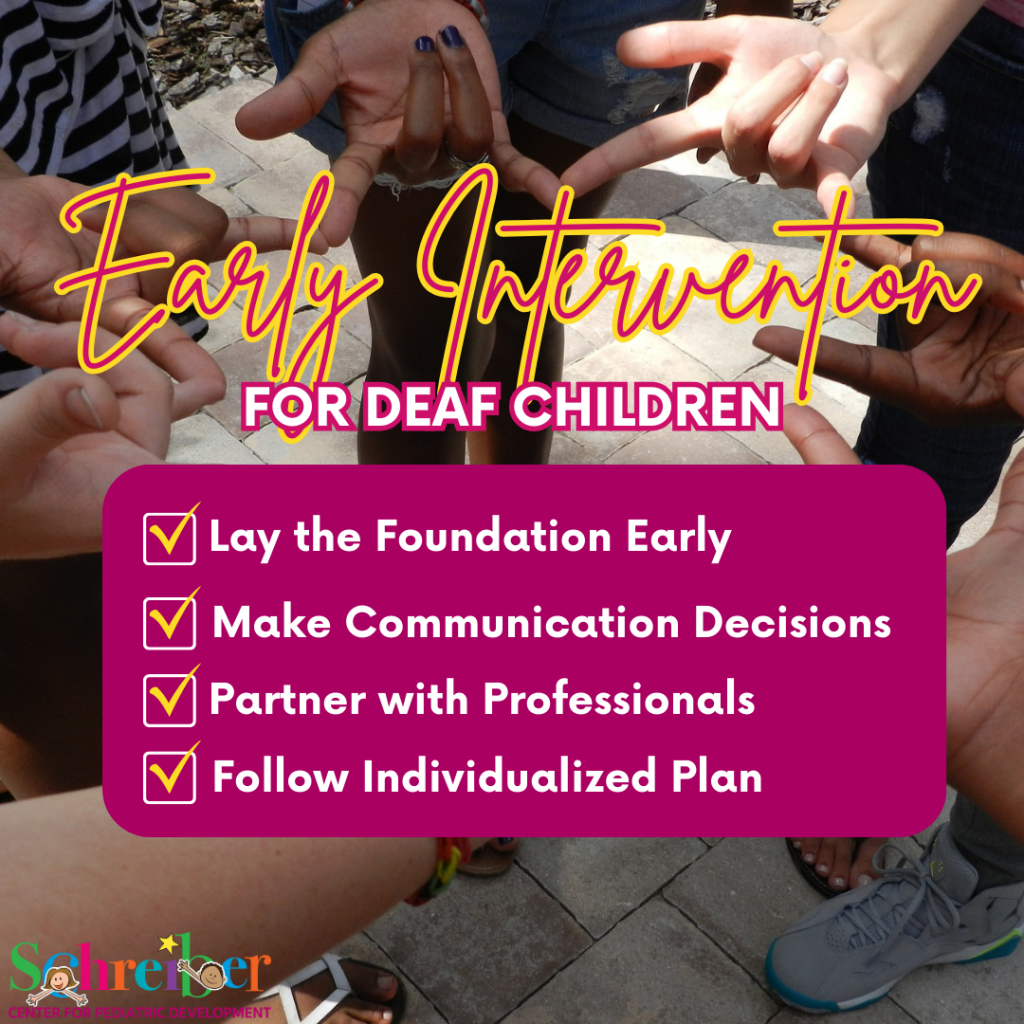
How to Support the Behavioral Health of Deaf Children
September 21, 2023Deaf children, like all children, deserve every opportunity to lead healthy and fulfilling lives. However, they often encounter unique challenges that can impact their behavioral health and overall well-being. From social isolation to academic struggles, the mental health journey for Deaf children can be complex. This post will explore the various behavioral health concerns Deaf children may face and look at different strategies to provide the support they need.
Understanding the Challenges
Social Isolation and Peer Exclusion: Communication barriers can lead Deaf children to feel isolated and make it difficult for them to form connections with their peers. They may find themselves on the outskirts of social interactions, leading to feelings of loneliness and exclusion.
Coping with Stigmas and Misconceptions: Deafness is often misunderstood, leading to stigmatization and misconceptions. These misunderstandings can impact a Deaf child’s self-esteem and self-worth.
Anxiety and Depression: The frustration of miscommunication and the pressure to fit in can contribute to anxiety and depression among Deaf children.
Academic Struggles: Inaccessible educational environments and inadequate support for children who are deaf, can lead to their academic struggles. These struggles can cause additional stress and have a negative impact on mental health.
Miscommunication within Families: Communication barriers between Deaf children and their hearing family members can lead to misunderstandings and strained relationships. Without a support system at home, their mental health can quickly decline.
Struggles with Self-Identity and Self-Esteem: Deaf children may grapple with their identity, especially when they feel caught between the Deaf and hearing worlds.
Lack of Access to Mental Health Services: Limited access to mental health services that cater to the unique needs and communication preferences of Deaf children can further exacerbate these challenges.
Strategies for Support
Identify & Encourage: Early intervention is key. By addressing potential issues early on and teaching children who are deaf coping skills and emotional regulation techniques, we can encourage Deaf children to embrace their identity and build self-confidence.
Effective Communication: We strive to ensure that Deaf children have access to communication methods that suit them. You can help by educating yourself and others about Deaf culture and communication strategies to foster understanding.
Inclusive Education: Advocating for inclusive education that allows Deaf children to learn alongside their hearing peers helps minimize social isolation. By implementing anti-bullying programs you can also help prevent and address bullying of children who are deaf.
Peer Support & Role Models: It’s important to create opportunities for Deaf children to connect with peers who share similar experiences. In introducing them to successful Deaf role models you can also help spark their inspiration and guide them to success.
Mental Health Services: Ensuring access to mental health services is one of the best things you can do to support the behavioral health of Deaf children. Specifically those that cater to Deaf children’s communication preferences. Be sure to provide information about these services in accessible formats.
Creating an Inclusive Environment
Supporting the behavioral health of Deaf children requires a community effort. By approaching their challenges with empathy and understanding, we can create environments where they can thrive. Let’s work together to build a world where Deaf children are empowered to achieve their full potential and lead emotionally healthy lives.
If you child is Deaf and you are interested in learning more about how Schreiber’s Pediatric Therapies can help your child visit: http://www.schreiberpediatric.org/therapy-services/
As a nationally recognized pediatric facility, the Schreiber Center for Pediatric Development provides family-centered education and therapy programs for infants, children and adolescents with disabilities, developmental delays, and acquired injuries. Our goal-oriented approach maximizes each child’s ability to function independently within the community.
